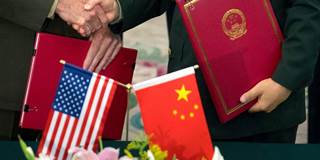Despite the US government’s recent upward revision to personal saving data, the overall national saving rate, which drives the current account, remains woefully deficient. And the major surplus countries – Germany, China, and Japan – have been only too happy to go along for the ride.
NEW HAVEN – In an increasingly interconnected global economy, cross-border trade and financial-capital linkages have come to matter more than ever. The current-account balance, the difference between a country’s investment and saving position, is key to understanding these linkages. The dispersion of current-account positions tells us much about the state of global imbalances, which are often a precursor of crises.

NEW HAVEN – In an increasingly interconnected global economy, cross-border trade and financial-capital linkages have come to matter more than ever. The current-account balance, the difference between a country’s investment and saving position, is key to understanding these linkages. The dispersion of current-account positions tells us much about the state of global imbalances, which are often a precursor of crises.